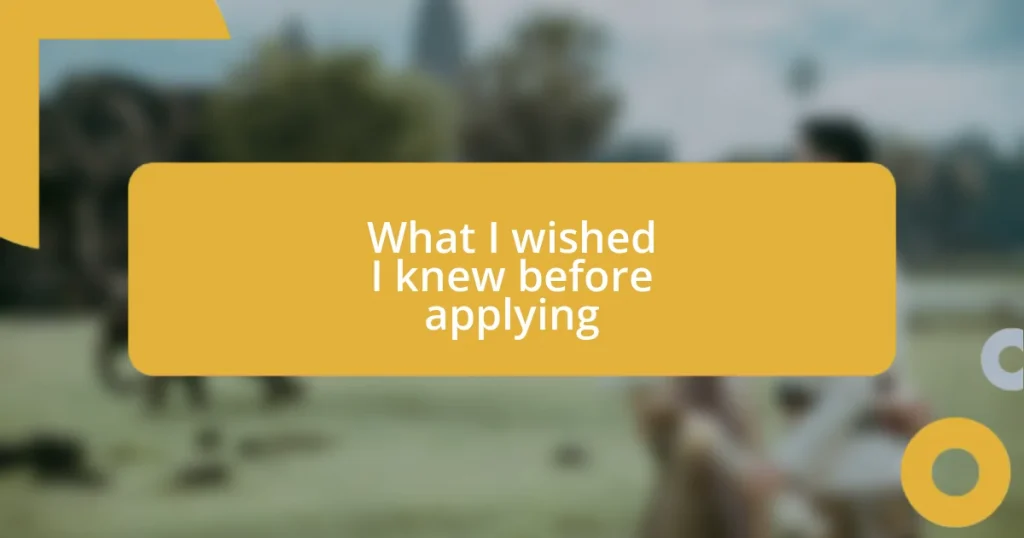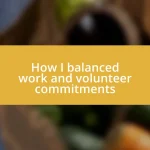Key takeaways:
- Understand the application process by breaking it down into steps, and prioritize planning to avoid missing deadlines.
- Research the institution deeply, focusing on campus culture, support services, and alumni success to make informed decisions.
- Gather strong recommendation letters by building relationships with mentors and allowing them ample time to provide thoughtful, specific insights.
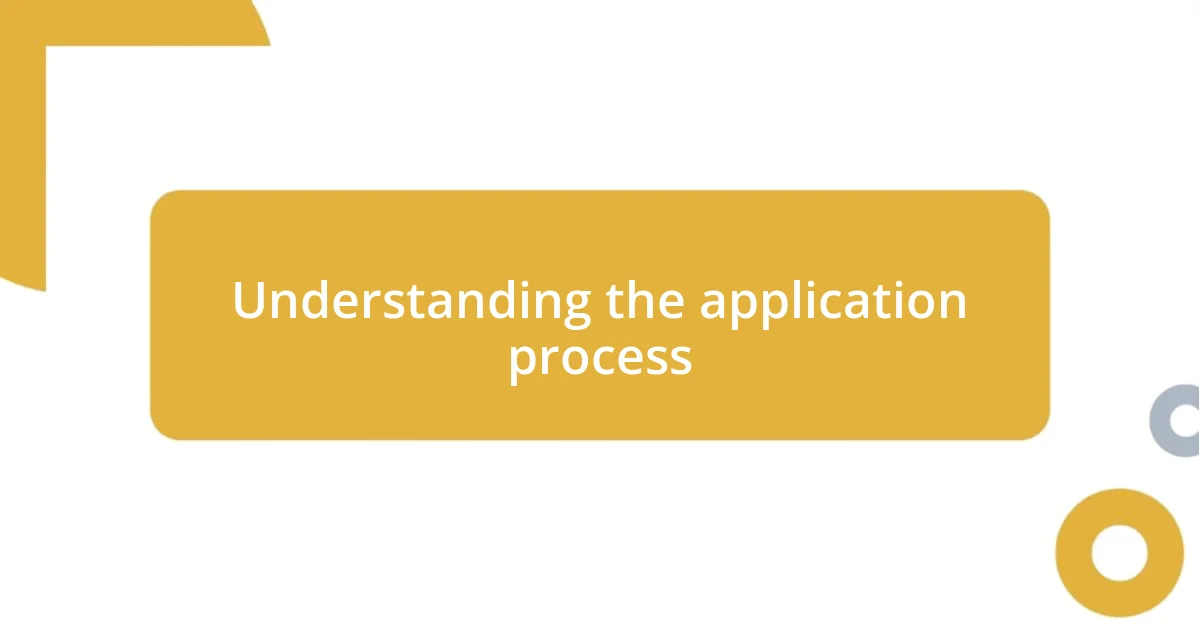
Understanding the application process
Understanding the application process can feel overwhelming, but it’s really about breaking it down into manageable steps. I remember feeling a mix of excitement and anxiety as I stared at the application form, wondering if I had included everything they were looking for. Did I highlight my strengths effectively? Those questions lingered, making it essential to revisit my application numerous times.
As I navigated through each stage, I discovered that timelines often creep up on you. Missing a deadline can derail your entire plan. I once lost track of time and panicked when I realized I had just a few days left to submit my essays. It taught me the importance of meticulous planning and setting personal deadlines well in advance.
Another pivotal moment for me was understanding the weight of personal statements and letters of recommendation. These elements provide insight into who you are beyond grades and test scores. I vividly recall sitting down with my recommenders, sharing my passions, and truly connecting. What stories do you want your recommenders to tell about you? That thought can shift your perspective from simply checking a box to genuinely engaging others in your journey.
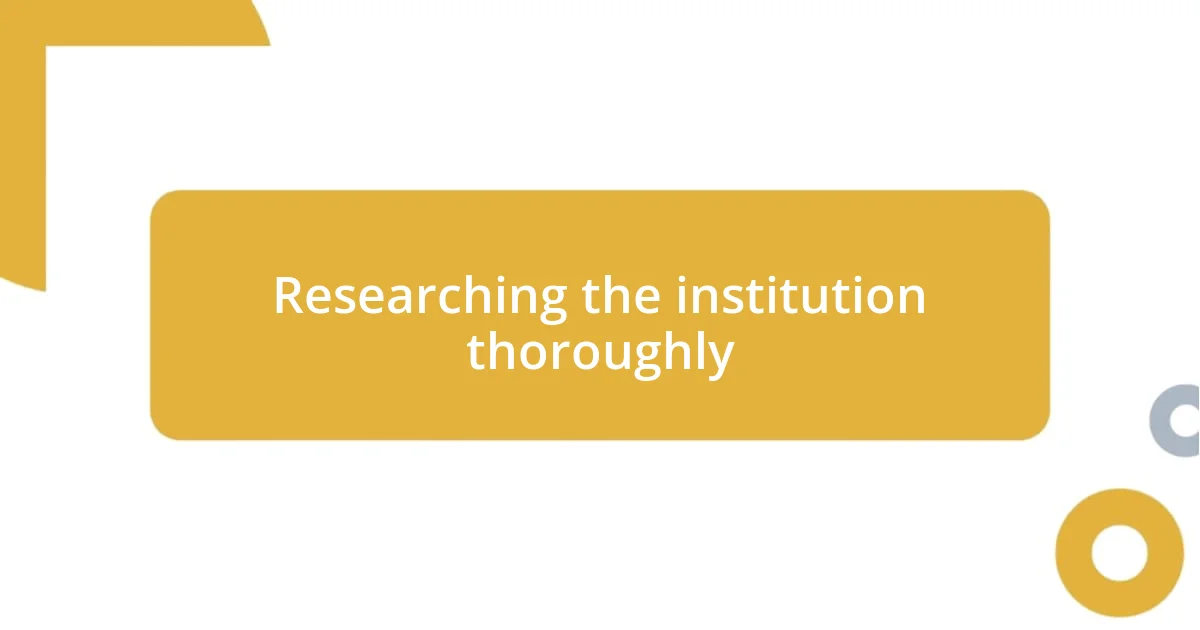
Researching the institution thoroughly
When it comes to researching the institution thoroughly, I wish I had known to dig deeper than just surface-level information. It’s easy to get caught up in the allure of rankings or flashy websites, but truly understanding the school culture is vital. During my own application journey, I stumbled upon online forums where current students shared their experiences. Those candid insights helped me grasp what living and learning at that institution would be like, influencing my decision tremendously.
Here are some key areas I recommend focusing on during your research:
- Campus Culture: Engage with current students on social media or attend virtual tours to get a feel for everyday life.
- Programs Offered: Look beyond majors; explore minors, extracurriculars, and special programs that align with your interests.
- Support Services: Investigate the availability of tutoring, mental health services, and academic advising, which can play a crucial role in your success.
- Financial Aid Opportunities: Examine scholarships specifically offered by the institution, as they can make a significant difference in your overall experience.
- Alumni Success Stories: Read about notable alumni and their career trajectories to understand the potential paths available after graduation.
If only I had taken the time to consider these aspects earlier, my decision-making process would have felt much clearer.
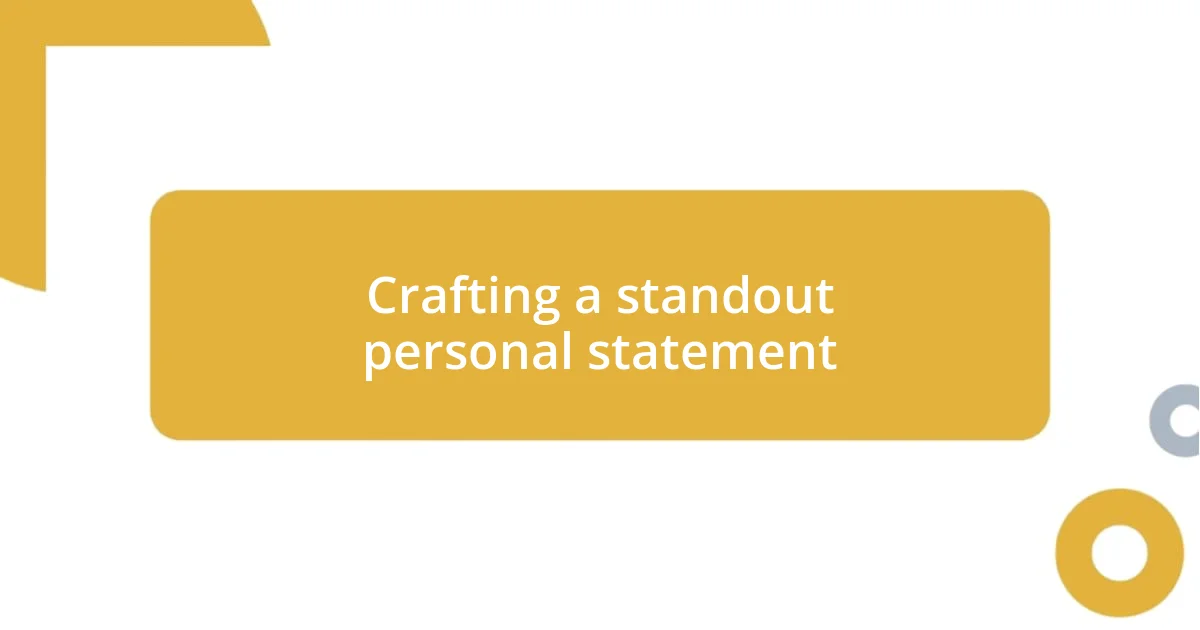
Crafting a standout personal statement
Crafting a standout personal statement can seem daunting, but it’s a chance to shine. I remember pouring my heart into my statement, trying to weave my story into a narrative that stood out. Reflecting on my journey, I realized the importance of authenticity. Your statement should resonate with who you truly are—not just what you think admissions officers want to hear.
The challenge is often finding the right balance between vulnerability and confidence. I struggled at first; I wanted to share my experiences but feared oversharing. It helped to think of my personal statement as a conversation with someone who truly cared about my story. What experiences shaped who I am today? This approach helped frame my narrative in a way that felt engaging and memorable.
A crucial tip I wish I had known was the value of specific examples. General statements can easily get lost in a sea of applications. In my personal statement, I eventually highlighted a moment when I overcame a significant challenge. Sharing that story not only showcased my resilience but also provided a glimpse into my character. Remember, this is your opportunity to leave a lasting impression.
| Tip | Importance |
|---|---|
| Authenticity | Staying true to your story makes it relatable and unique. |
| Finding Balance | Sharing personal experiences while maintaining professionalism engages the reader. |
| Specific Examples | Concrete anecdotes make your application memorable and impactful. |
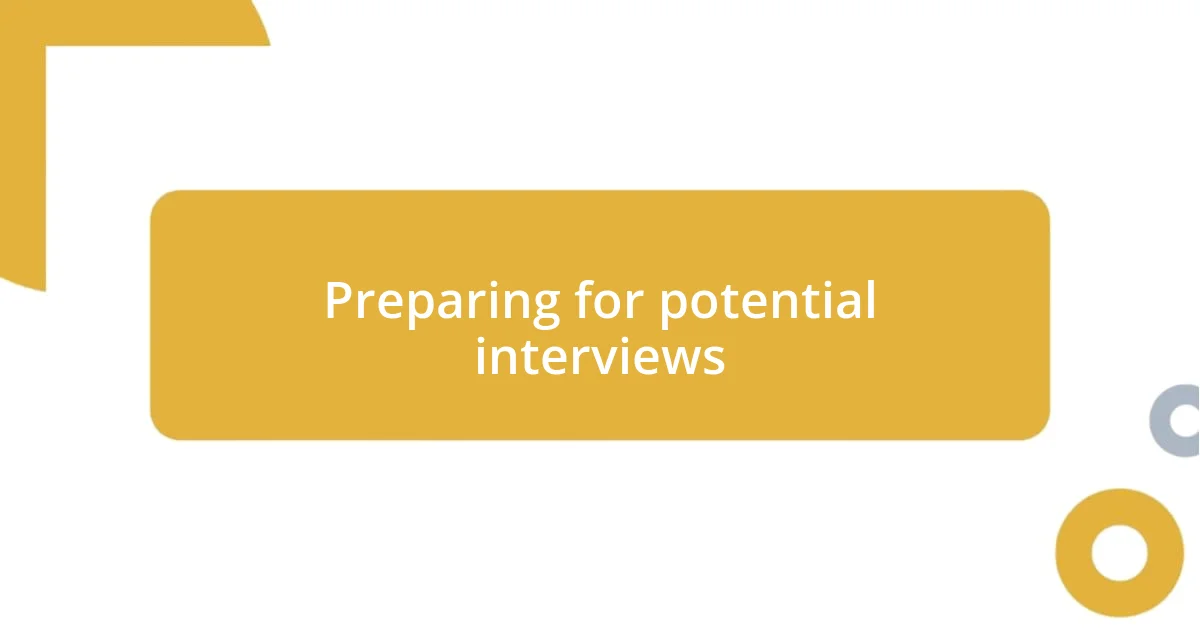
Preparing for potential interviews
Preparing for interviews can feel overwhelming, but I’ve learned that it doesn’t have to be. One thing I wish I had realized sooner is how valuable mock interviews can be. Practicing with friends or mentors helped me articulate my thoughts and boosted my confidence. I remember the nerves I felt before my first real interview. Practicing made a world of difference, allowing me to focus on my responses rather than my anxiety.
Additionally, I can’t stress enough the importance of familiarizing yourself with common interview questions. It’s one thing to know the theory behind your subject; it’s another to discuss it clearly and concisely under pressure. In my experience, being prepared for questions like “What motivates you?” or “Where do you see yourself in five years?” helped me stay composed and presented me as self-assured. After all, it’s not just about what you say; it’s how you say it that can really resonate with the interviewers.
Lastly, don’t underestimate the power of asking your own questions during an interview. This is your chance to determine if the institution is the right fit for you as well. I vividly recall asking about the support systems in place for new students. The interviewer’s positive response not only reassured me but also sparked a meaningful dialogue. By engaging in this way, I demonstrated my genuine interest and made myself memorable. What will you ask to ensure the institution aligns with your aspirations?
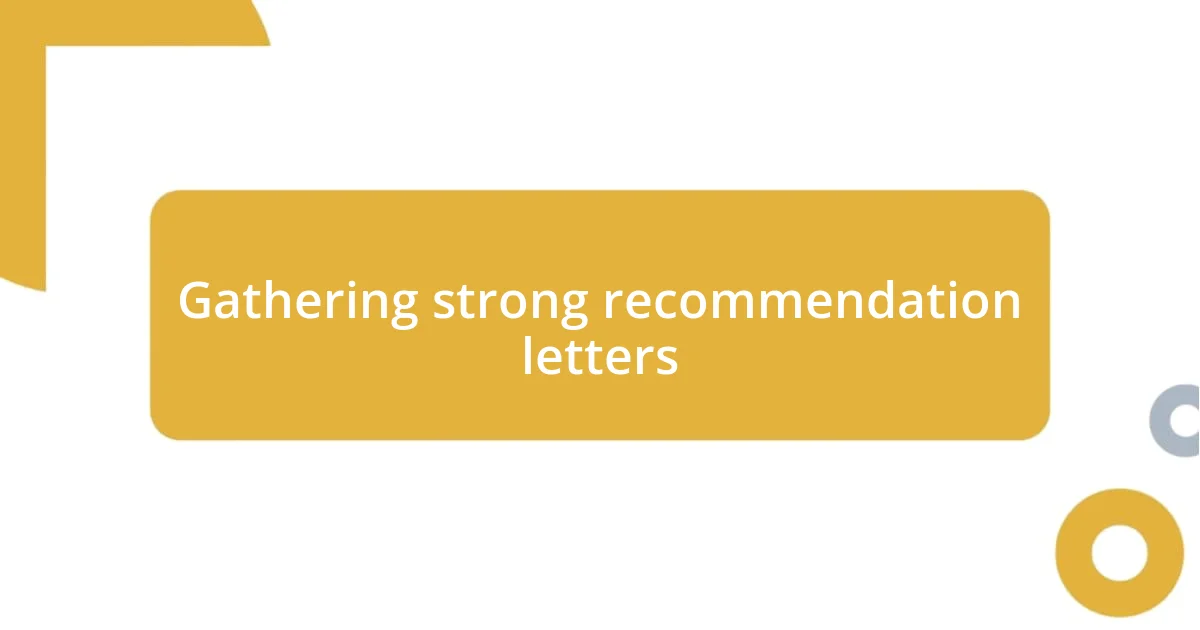
Gathering strong recommendation letters
Gathering strong recommendation letters is more vital than many realize. I remember feeling a mix of excitement and anxiety when I approached my mentors. It’s crucial to choose individuals who genuinely know you and can speak to your character and accomplishments. A vague letter won’t make the same impact as one that includes specific examples of your achievements or contributions. Have you thought about who could provide that insight into your journey?
I learned the importance of fostering relationships well before I needed those letters. During my college years, I made a habit of connecting with my professors and engaging with them in meaningful discussions. This not only helped me academically but also laid the groundwork for strong recommendations later on. When I asked one professor for a letter, he spoke passionately about my project, which I had poured myself into. Moments like that can make all the difference in how your application is perceived.
Lastly, giving your recommenders adequate time is essential. I once hastily asked for a letter on short notice and regretted it. It turned out to diminish the quality of the recommendation, and I learned the hard way that a rushed request often leads to a lukewarm letter. I now always provide clear deadlines and context for my requests, which can help ensure your recommenders are set up for success. How do you plan to give your recommenders the support they need to write you a stellar recommendation?
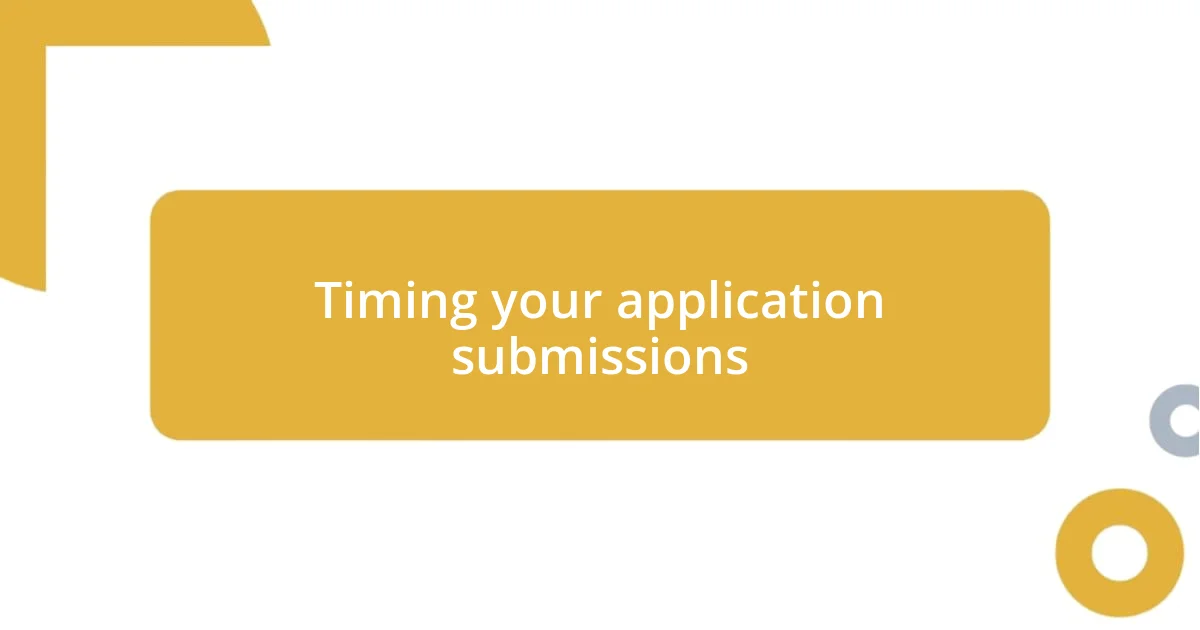
Timing your application submissions
Timing your application submissions can be a game-changer in the process. I remember frantically piecing together my application at the last minute when I could have benefited from a more strategic approach. Submitting earlier not only gives you a cushion for unexpected issues but also allows reviewers to appreciate your application without being swamped by a last-minute influx. Do you ever think about the power of timing in your own applications?
Furthermore, understanding peak times for submissions can give you the upper hand. There are often times of the year when schools and employers receive more applications than usual, causing them to rush through the entire process. I learned from experience that submitting a week or two early helped my application stand out in a less crowded pool. Have you considered how the timing of your application might create an impression before it even gets read?
Lastly, I can’t emphasize enough how important it is to stay aware of application deadlines as they often vary depending on the program or institution. I once missed out on an opportunity simply because I neglected to check a specific deadline. A good way to prevent that is to create a timeline or checklist for all your applications, marking each deadline clearly. What strategies will you use to keep your application timelines organized and on track?
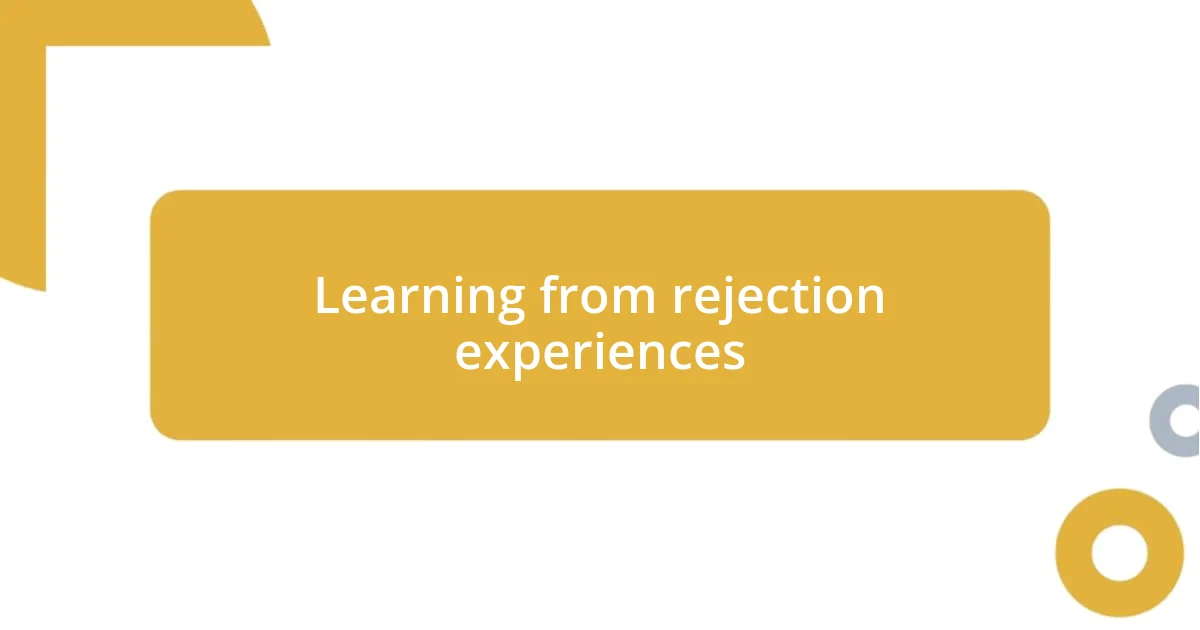
Learning from rejection experiences
One of the most valuable lessons I learned from rejection is that each “no” often brings a more profound understanding of myself and my goals. After I received a rejection email from a program I desperately wanted to join, I took some time to reflect. It hurt, but I sat down with a journal to dissect what I could have done differently. What insights can rejections bring that you might not see at first?
In my case, the rejections were hard to swallow, but they became a catalyst for growth. I enrolled in workshops to sharpen my skills and spent time networking with professionals in my desired field. These experiences not only built my confidence but also refined my focus on what I genuinely wanted to achieve. Have you ever thought about how rejections might guide you toward a clearer path?
I also learned that perspective is everything. While it’s natural to feel disheartened, I found it essential to view rejection as a stepping stone rather than a stumbling block. When I finally received acceptance into a program, it felt all the more rewarding because I had embraced the journey, including its setbacks. How might changing your perspective on rejection empower you in your own application process?










